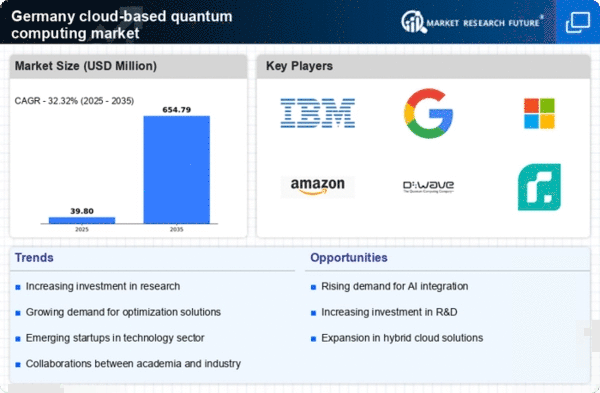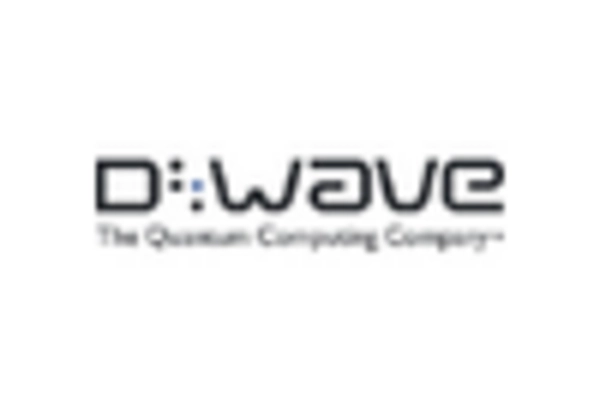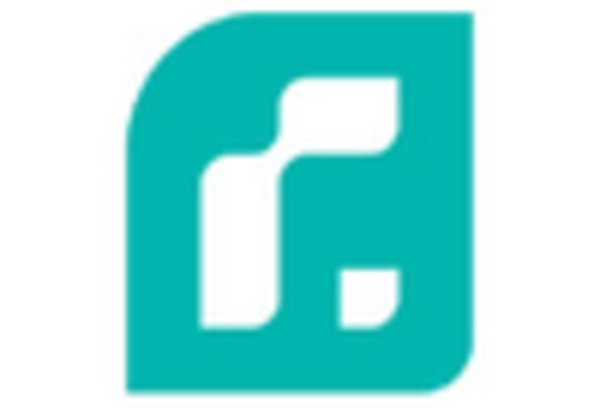Increased Focus on Cybersecurity
As the cloud based-quantum-computing market evolves, there is a growing emphasis on cybersecurity measures to protect sensitive data. Quantum computing has the potential to revolutionize encryption methods, making traditional security protocols obsolete. In Germany, organizations are increasingly aware of the risks associated with quantum threats and are investing in quantum-safe encryption solutions. This trend is expected to drive demand for cloud based-quantum-computing services that offer enhanced security features. The market for quantum cybersecurity solutions is anticipated to grow significantly, with estimates suggesting a potential market size of €300 million by 2026. This focus on cybersecurity is likely to be a key driver for the cloud based-quantum-computing market.
Government Initiatives and Funding
The German government has been actively promoting the development of the cloud based-quantum-computing market through various initiatives and funding programs. In 2025, the government allocated €650 million to support research and development in quantum technologies, aiming to position Germany as a leader in this field. These initiatives not only foster innovation but also encourage collaboration between public and private sectors. The funding is expected to enhance the capabilities of local startups and established companies, thereby accelerating the adoption of cloud based-quantum-computing solutions across various industries. This supportive environment is likely to attract further investments and talent, contributing to the overall growth of the market.
Emergence of Hybrid Quantum-Classical Systems
The development of hybrid quantum-classical systems is emerging as a pivotal driver for the cloud based-quantum-computing market in Germany. These systems combine classical computing power with quantum capabilities, enabling organizations to tackle complex problems more efficiently. As businesses seek to optimize their operations, the integration of hybrid systems is becoming increasingly attractive. This trend is supported by advancements in quantum algorithms and software, which facilitate the seamless interaction between classical and quantum computing environments. The adoption of hybrid systems is expected to enhance the overall performance of cloud based-quantum-computing solutions, thereby attracting more users and driving market growth.
Rising Demand for Advanced Computing Solutions
The cloud based-quantum-computing market in Germany is experiencing a notable surge in demand for advanced computing solutions. Industries such as finance, pharmaceuticals, and logistics are increasingly seeking to leverage quantum computing capabilities to solve complex problems that traditional computing cannot efficiently address. This demand is driven by the need for faster data processing and enhanced analytical capabilities. According to recent estimates, the market for quantum computing in Germany is projected to reach approximately €1.5 billion by 2027, reflecting a compound annual growth rate (CAGR) of around 25%. As organizations recognize the potential of quantum technologies, investments in cloud based-quantum-computing services are likely to escalate, further propelling market growth.
Growing Interest in Quantum Research and Development
There is a burgeoning interest in research and development within the cloud based-quantum-computing market in Germany. Academic institutions and research organizations are increasingly collaborating with industry players to explore innovative applications of quantum technologies. This collaborative approach is fostering a vibrant ecosystem that encourages knowledge sharing and technological advancements. In 2025, it is estimated that investment in quantum research in Germany will exceed €400 million, reflecting a commitment to advancing the field. This growing interest is likely to lead to breakthroughs that could significantly enhance the capabilities of cloud based-quantum-computing solutions, further stimulating market growth.

















